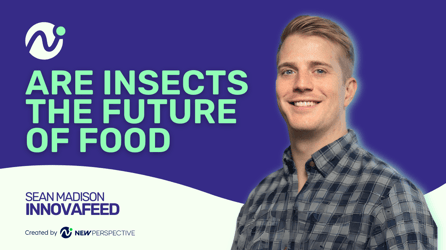Redefining Food Sustainability: Upcycling Food Waste
Renewal Mill operates as an upcycling food enterprise dedicated to combating climate change and food wastage. They transform byproducts generated during food manufacturing into high-quality superfood ingredients and top-tier, plant-based pantry essentials.
The company strives to establish a fresh circular food economy, effectively closing gaps in existing supply chains, salvaging valuable nutrition from being squandered, and diminishing our environmental footprint.
Watch the episode on YouTube
Listen to episode on Zencastr
Interview with Caroline Cotto, CEO of Renewall Mill
Dunja Jovanovic: Welcome, Caroline, to the Green New Perspective podcast. Let's dive right into it. Can you help our listeners understand the importance of addressing food waste and its impact on climate change?
Caroline Cotto: Absolutely, thank you for having me. Food waste is a critical issue that's often overlooked. Globally, we discard approximately 40% of the food we produce each year, an astonishing amount that mostly ends up in landfills, emitting harmful greenhouse gasses. But the consequences go beyond that.
Wasting food also squanders precious resources like water, nutrients, and energy that were used in its production. This means not only the emissions from its disposal but also the carbon footprint of growing and harvesting the food. In fact, according to Project Drawdown, a prominent climate research organization, reducing food waste is one of the most effective strategies to combat climate change, closely followed by adopting plant-based diets.
In total, food waste contributes to about 8% of global greenhouse gas emissions.
DJ: Could you share with us the origins of your company, Renewal Mill, and how it aims to mitigate the impacts of food waste?
CC: The issue of food waste is pervasive across the supply chain. It occurs when produce doesn't meet cosmetic standards, consumers overpurchase and discard, and even during manufacturing processes.
My co-founder Claire Schlemme and I came across this problem when she had a juice company and faced a surplus of fruit and vegetable pulp daily. We then connected with a tofu company owner who revealed they had a similar issue with soybean pulp, known as Okara, which is rich in fiber and protein. This pulp, otherwise discarded, presented an opportunity to rescue nutrition.
Renewal Mill's mission is to tap into these underutilized parts of the food system, capturing valuable nutrients and redirecting them back into the human food supply chain through our upcycling process.
DJ: As you navigate the upcycling space, how do you go about educating consumers and building awareness about the benefits of upcycled food?
CC: Educating consumers about upcycled food is a crucial aspect of our work. While upcycling isn't a new concept to everyone, we focus on aligning it with the circular economy idea. Just like repurposing old furniture or clothing, upcycling food brings unused resources back into the cycle.
We emphasize the idea that upcycled food is not only a climate-friendly solution but also delicious and nutritious. Our messaging centers around the concept that consumers can make a positive impact by choosing upcycled products, ultimately enabling them to combat food waste through their purchasing decisions.
DJ: Shifting gears, could you elaborate on how Renewal Mill contributes to enhancing food security and accessibility, particularly for communities facing challenges in accessing nutritious food?
CC: By focusing on upcycling nutritious components that are often discarded, we're tackling two issues simultaneously.
First, we're rescuing valuable nutrients that might otherwise go to waste, which can then be used to enrich various food products. Second, we're enhancing the availability of these nutrient-rich ingredients for food companies to incorporate into their products, thus increasing the nutritional content of the final goods.
While we're not directly distributing to food-insecure communities, our ingredients contribute to a broader movement of reducing waste and increasing the nutritional value of food products, which can benefit these communities indirectly over time.
DJ: Partnerships seem to be a key element in your approach. Could you tell us more about the partnerships and collaborations Renewal Mill has established with organizations within and outside the food industry?
CC: Partnerships are at the core of our strategy. We partner with suppliers to upcycle their byproducts, which is the foundation of our business model. For instance, we collaborate closely with tofu and soy milk producers, oat milk producers, and even companies in the juicing and fruit industries to capture valuable waste materials.
On the marketing side, we forge partnerships with like-minded brands to amplify our message. For example, we've partnered with Mioko's Creamery, a vegan butter company, combining our efforts to promote sustainable and delicious food choices.
DJ: As you've built your brand, have you encountered any challenges, and how have you overcome them?
CC: Challenges are inherent to entrepreneurship, and they certainly shape the journey. One challenge has been fundraising. Our unique model sometimes doesn't fit neatly into predefined categories for investors, as we operate as both an ingredients company and a consumer packaged goods company. Finding investors who understand and align with our vision has required some effort.
Another challenge has been introducing novel ingredients to the market. Educating consumers about the benefits of our upcycled products and creating familiarity around them has taken time and creativity. Adapting our messaging and approach based on feedback has been crucial in overcoming these challenges.
DJ: As we look to the future, how do you envision the evolution of the upcycled food industry, and how will Renewal Mill continue to contribute to this movement?
CC: Our vision for the future is one where upcycled food is integrated seamlessly into various categories across the grocery store. We aim for widespread adoption, creating products that span multiple segments and highlight the value of upcycled ingredients. As the industry grows, so does our reach. We're excited to continue educating consumers about upcycling through initiatives like the Upcycled Food Association, which we helped establish.
Our goal is to make upcycled food a natural choice for consumers, allowing them to enjoy delicious products while contributing to a more sustainable future.
DJ: Your journey and experiences provide valuable insights for others in the sustainability space. What advice would you offer to fellow entrepreneurs looking to create circular economy products and contribute to a greener world?
CC: First and foremost, approach the problem with a beginner's mindset. Understand the issue from every angle and be willing to adapt your solutions accordingly. Collaboration is key—work together with other innovators to accelerate progress. Flexibility and adaptability are essential traits for entrepreneurs in the sustainability space.
Also, focus on the positive impact you can make, even in the face of challenges. Remember, every small step contributes to a larger, more sustainable future.
Find us on podcasting platforms:
Follow us on social media:

.png?width=480&height=480&name=Renewal%20Mill%20(2).png)


